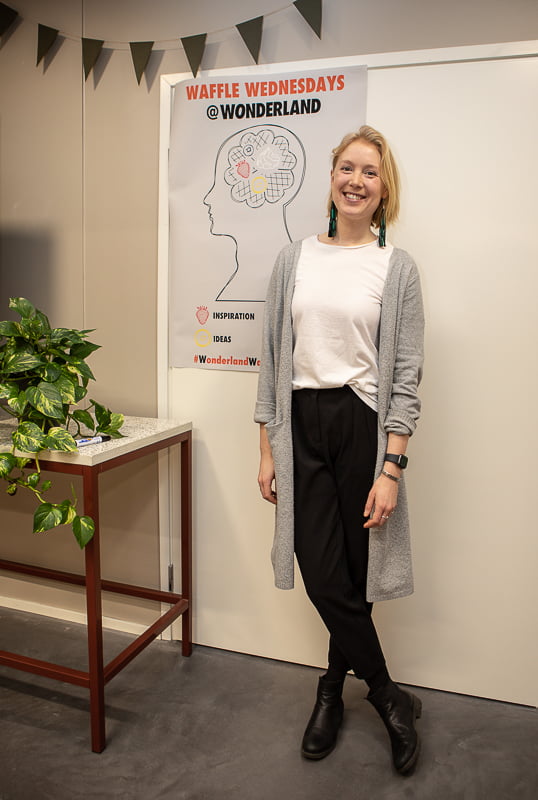The first Waffle Wednesday of the decade was launched on January 15th and led by a well-being professional Laura Liefveld. Laura is a yoga teacher and self-compassion instructor. Prior to becoming an entrepreneur, Laura has worked extensively in various fields of occupation. After attending a Yoga instructor training in India, she became aware of the power of mindfulness and realized how self-criticism had a massive negative impact on her life. This experience sparked her interest in the Mindful Self-Compassion (MSC).
The topic of the lecture was a good start for the day. The pressures to perform perfectly in every aspect of life are constantly increasing and therefore self-compassion is a beneficial skill to learn
Our lesson began with a meditation exercise that encouraged participants to focus on the present and the body sensations. In theory, one could imagine that breathing and living in the moment is very obvious and easy. However, clearing a head from the hustle and bustle of the day is not so simple or quick in practice. The good news is that self-compassion is a skill like any other and it can be learned too!
Laura describes how in 2017 she found relief for her fear of public speaking through self-compassion exercises. Laura’s soothing voice and calm character makes it hard to imagine that she has ever felt nervous about lecturing in front of the crowd.
Mindfulness related self-compassion refers to the recognition of one’s own suffering and unbalanced state of mind, which gets responded by self-compassion and care. To stop the vicious cycle of negative feelings caused by self-criticism, it is essential to learn to understand oneself and accept the occasional feelings of discomfort as a part of humanity and life. Practicing self-compassion helps to overcome difficulties and it increases overall well-being. That way it will also make a positive effect on those who are around you.
The three elements of self-compassion are:
1. Self-kindness vs. Self-Criticism
Self-compassion means being warm and understanding towards ourselves when we suffer, fail or feel inadequate, rather than ignoring our pain or instigating self-criticism. Self-kindness increases the emotional balance.
2. Common Humanity vs. Isolation
Suffering and personal inadequacy are part of the shared experience of humanity – something we all go through instead of something that happens to “me” alone.
3. Mindfulness vs. Over-identification
Mindfulness is a non-judgmental, receptive mind state in which one observes thoughts and feelings as they are, without trying to suppress or deny them. Negative emotions should not be interpreted as a leading to a damaging cycle of over-thinking.
Laura also reminds how self-acceptance should not be confused with vanity, laziness or weakness. By practicing inner understanding, we learn to understand and help others, not only ourselves. For example, being kind to ourselves does not mean allowing ourselves to eat junk food every day. Self-acceptance motivates us to act in healthy ways that increase our mental and physical well-being.
If it seems difficult to internalize self-acceptance, Laura comforts us by telling that we all have already been ”forced” to take care of ourselves in many different ways to get this far. Also, anyone can learn how to increase self-compassion in everyday life for example:
1. Physically – doing sports, relaxing
2. Mentally – meditation, reading an inspiring book
3. Emotionally – crying
4. Socially – meeting friends
5. Spiritually – praying, helping others
For those interested in the related literature, Laura recommends American authors Christopher Germer and Kristin Neff. Germer and Neff, the masters of self-compassion, have also founded the Mindful Self-Compassion Program (MSC), which helps to develope self-compassion through mindfulness-based exercises. Laura also mentions Ronnie Grandell as a Finnish author for the book “Irti itsekritiikistä” published in 2018.
At the end of the lecture, Laura redirected the listeners minds back to their own self-examination and self-acceptance through a practice called “Self-Compassion break”.
Our sense of self-compassion gets many strokes in life, but with practice it is possible to develop positive thinking towards oneself. The most important thing to remember is that we are all imperfectly perfect people and people make mistakes.
You can register for Laura´s 8-week MSC course starting on March 24, 2020 through Laura’s website.
For more information you can also e-mail her to: lauraelenayoga@gmail.com.

